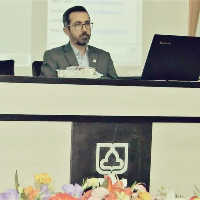The semantics of the word " Za'm " (assumption) in the Qur'an based on Izutsu’s theory
Some Quranic words such as doubt, assumption, guess, incertitude, misgiving, etc., despite semantic similarities, have different connotative dimensions and sometimes translators make errors in the act of translation. One of the appropriate ways to reach the exact meaning of the words of the Qur'an is to use the method of semantics, through which understanding the true meaning of words leads to a proper translation. One of Toshihiko Izutsu's methods in semantics is to study the semantic field. Using a descriptive-analytical method, based on Izutsu’s theory, this article tries to explore the semantic field of the word assumption. First, the poetry of Jahiliyyah (Age of ignorance) has been examined based on the semantic evolution of Izutsu's theory. Then, by determining the focal, key and sub-words, the semantic relations of this field and the distribution of the repetition of the word "Za'm" and its derivatives in the Meccan and Medinan Surahs have been examined. The findings of this study show that after the revelation of the Qur'an, the connotative dimension of invalidity and falsehood in the semantic units of the word Za'm has become more prominent; its correct meaning equals false assumption, and mentioning the word "false" has a great effect on the translated text. This semantic dimension can be justified by considering the repetition of most derivatives of "Za'm" in Meccan Surahs Makki due to the connection of the content with the principles of religion, in comparison with Medinan Surahs, the content of which often relates to rulings, social affairs, etc.
Quran , semantics , Izutsu , Za'm , False assumption
-
A critical discourse analysis study of Barid Al-Lail (explanation and interpretation levels)
*, Reyhane Emami Chahartagh
Studies in Arabic Narratology journal, -
The semantics of the word “dispute” based on the seven types of Izutsu's simultaneous semantic theory
Sakineh Mosavi Asl, Shaker Ameri *, Ali Akbar Noresideh
Journal Of Linguistic and Rhetorical Studies,


